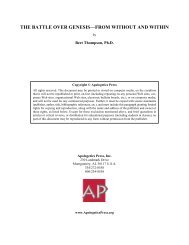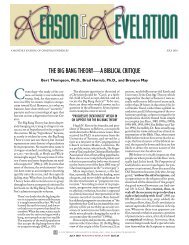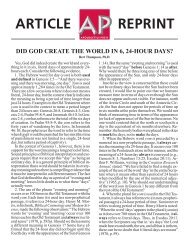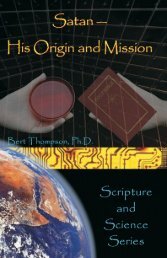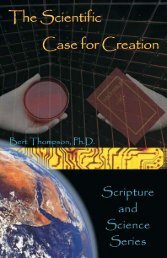The Many Faces, and Causes, of Unbelief - Apologetics Press
The Many Faces, and Causes, of Unbelief - Apologetics Press
The Many Faces, and Causes, of Unbelief - Apologetics Press
You also want an ePaper? Increase the reach of your titles
YUMPU automatically turns print PDFs into web optimized ePapers that Google loves.
pared to explain why. When Christians state that God<br />
exists <strong>and</strong> <strong>of</strong>fer evidences to support this claim, they<br />
have moved the debate into a new arena—an arena in<br />
which atheists must prove that the Christian evidences<br />
are erroneous (1997, p. 20, emp. in orig.).<br />
If evidence for God’s existence has been set forth, the atheist<br />
has a responsibility (if he expects his world view to be considered<br />
seriously <strong>and</strong> accepted intellectually) to show why<br />
such evidence is not legitimate. After all, the Law <strong>of</strong> Rationality<br />
(one <strong>of</strong> the foundational laws <strong>of</strong> human thought) states<br />
that one should draw only those conclusions for which there<br />
is adequate <strong>and</strong> justifiable evidence. Indifference to such evidence—in<br />
light <strong>of</strong> the claim made by the atheist that God does<br />
not exist—could prove to be suicidal philosophically. <strong>The</strong> evidence<br />
just might document the theist’s claim. And in the process,<br />
the atheist just might be proven wrong!<br />
Second, in his book, Dismissing God, under the chapter heading,<br />
“When Disbelief Has Gone,” Bruce Lockerbie rightly remarked:<br />
To disbelieve necessitates the possibility <strong>of</strong> a reasonable<br />
alternative, namely to believe. So “when<br />
disbelief has gone” means that the secular mind has<br />
passed even beyond this stage <strong>of</strong> contesting with<br />
Christian orthodoxy, no longer deigning to concern<br />
itself with the fantasies <strong>of</strong> faith (1998, p. 228, emp. in<br />
orig.).<br />
While it may be the case that the modern-day unbeliever<br />
no longer deigns to concern himself with what he views as<br />
“fantasies <strong>of</strong> faith,” such an attitude does nothing to address<br />
the evidence presented by the theist. Nor does indifference<br />
to the theist’s evidence on the part <strong>of</strong> the atheist do anything<br />
to establish whatever type <strong>of</strong> unbelief the atheist wishes to<br />
recommend in its place. Lockerbie is correct: “To disbelieve<br />
necessitates the possibility <strong>of</strong> a reasonable alternative, namely<br />
to believe.” Thus, the atheist shoulders two burdens: (1) to<br />
prove the theist’s evidence is invalid; <strong>and</strong> (2) to establish—<br />
with attending evidence—a belief system that is a “reasonable<br />
alternative” worthy <strong>of</strong> acceptance by rational, thinking people.<br />
-12



